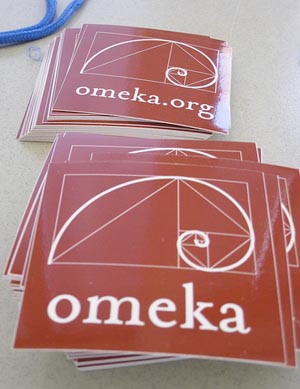From CUNY Academic Commons
Omeka is an open-source software platform developed by the Center for History and New Media at George Mason University. As a “web-based publishing platform for scholars, librarians, archivists, museum professionals, educators, and cultural enthusiasts” (Omeka About Page, 2009, para. 1), Omeka resembles WordPress, with its plugins and themes, but is a very different platform.
Omeka is OAI-PMH compliant, and is based on Dublin Core. It can ingest metadata in both CSV format and in XML. Point it at a open access repository and it can suck in collections whose XML is exposed for harvesting. Examples I’ve tried include a couple from the American Memories Collection (Library of Congress). These are digital collections, and Omeka ingests all the metadata, and the Dublin Core “identifier” field is generally a link to the image itself. Pretty cool…
For a good example of Omeka in action, check out Lincoln at 200
Serious Web Publishing
Museums, scholars and schools are actively experimenting with Omeka. Omeka allows for many collections, and has a plug-in that creates exhibits. It is easily to extend through PHP, CSS, Javascript and HTML. And a plug-in allows a collection’s metadata to be exposed for harvesting by indexers and others, including other Omeka powered websites.
Getting Started
To run Omeka on your own server, you can use Omeka.org. A hosted version of Omeka is available at Omeka.net. For a comparison of the two, see the About page.
Amanda French has posted an excellent “Introduction to Omeka” workshop lesson plan that can also serve as a tutorial.
Related Pages


